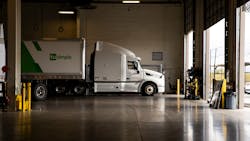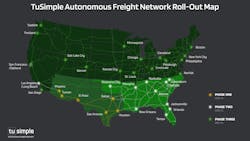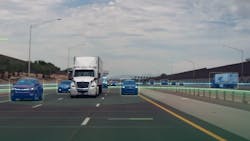TuSimple has launched the first Autonomous Freight Network (AFN), an ecosystem consisting of autonomous trucks, digital mapped routes, strategically placed terminals, along with TuSimple Connect, the company’s autonomous operations monitoring system.
The AFN integrates with existing logistics networks and transportation management systems to enable long-haul autonomous freight operations. Additionally, TuSimple technology allows autonomous trucks to be 10% more fuel-efficient than manually driven trucks, and in the future operate continuously without hours of service limitations, according to the company.
"Our ultimate goal is to have a nationwide transportation network consisting of mapped routes connecting hundreds of terminals to enable efficient, low-cost long-haul autonomous freight operations," said Cheng Lu, president of TuSimple. "By launching the AFN with our strategic partners, we will be able to quickly scale operations and expand autonomous shipping lanes to provide users access to autonomous capacity anywhere and 24/7 on-demand."
The AFN will roll out in three phrases, and lays the groundwork for self-driving autonomous trucks to become commercially available by 2024:
- Phase I (2020-21) will offer service between the cities of Phoenix, Tucson, El Paso, Dallas, Houston, and San Antonio.
- Phase II (2022-23) will expand AFN service from Los Angeles to Jacksonville and connect the east coast with the west.
- Phase III (2023-24) will expand driverless operations nationwide adding major shipping routes throughout the lower 48 states allowing customers to utilize their own TuSimple equipped autonomous trucks on the AFN by 2024.
The company will replicate the strategy in Europe and Asia after the AFN rolls out nationwide.
U.S. Xpress, a fleet of 7,000, will provide additional lanes to aid TuSimple's L4 technology learning. With access to more lanes, TuSimple can advance its understanding of and refine its responses on the road, making it safer for professional truck drivers and those they share the highways with.
"For the past two years, U.S. Xpress has worked closely with TuSimple to help define carriers' needs for L4 trucks," said Eric Fuller, president and CEO of U.S. Xpress. "We are interested in understanding how TuSimple technology can make our fleet safer and more fuel efficient as well as how it can improve the overall delivery experience for our professional drivers and customers."
TuSimple already operates autonomously on seven different routes between Phoenix, Tucson, El Paso, and Dallas. This fall, TuSimple will open a new shipping terminal in Dallas, allowing the self-driving truck company to service customers in that region. The terminals are designed to give mid-sized customers access to the advantages of autonomous trucking. For high-volume customers, TuSimple will continue to map routes and deliver directly to their distribution centers.
With the AFN, the company is also launching TuSimple Connect, an autonomous operations monitoring system to ensure safe autonomous operations and allow customers to track their freight in real-time.
Penske Truck Leasing, which operates more than 750 service facilities throughout North America, will help TuSimple to scale its fleet operations nationwide. Penske will also provide preventive maintenance and over-the-road service to TuSimple's L4 autonomous trucks to help keep them running day and night.
"Penske has always been committed to supporting its customers and innovation when it comes to mobility," said Bill Combs, vice president connected vehicle strategy and experimentation at Penske. "We look forward to our continued collaboration with TuSimple and supporting their fleet needs as this new freight network begins to scale."
About the Author
FleetOwner Staff
Our Editorial Team
Kevin Jones, Editorial Director, Commercial Vehicle Group
Josh Fisher, Editor-in-Chief
Jade Brasher, Senior Editor
Jeremy Wolfe, Editor
Jenna Hume, Digital Editor
Eric Van Egeren, Art Director


